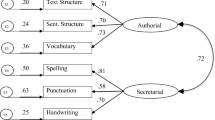Abstract
This study investigated the presence and growth of kindergarten children's metacognition as they engaged in the writing process. The study was conducted in an environment that surrounded children with books, language, and print. Twice a month the teacher/researcher interviewed the children as they finished writing, asking questions designed to help them reflect on their thinking and strategies they used in their writing. Anecdotal records, observations, and individual writing folders were used to complete a checklist of writing strategies for each child. Interviews with the children confirmed that they were exhibiting and showing growth in their metacognition. They were able to provide appropriate answers to questions that required them to talk about their thinking and identify strategies that helped them in their writing. The study provides a model that could be used in classrooms to help children in the development of their growing metacognition and writing in an authentic learning environment.
Similar content being viewed by others
REFERENCES
Burns, M. S., & Snow, C. E. (Eds.). (1999). Starting out right: A guide to promoting children's reading success. Washington, DC: National Academy Press.
Cambourne, B., & Turbill, J. (1987). Coping with chaos. Portsmouth, NH: Heinemann.
Campione, J. C., & Brown, A. L. (1985). Dynamic assessment: One approach and some initial data. (Technical Report No. 361). Urbana: Illinois University, Center for the Study of Reading. (ERIC Document Reproduction Service No. ED 269 735)
Dyson, A. H. (1990). On teaching writing: A review of the literature (Occasional Paper No. 20). Berkeley: University of California.
Ferrari, M., & Sternberg, R. (1998). The development of mental abilities and styles. In W. Damon, D. Kuhn, & R. Siegler (Eds.), Handbook of child psychology, Vol. 2 (5th Ed.), Cognition, perception and language (pp. 899–946). New York: John Wiley & Sons, Inc.
Flavell, J. H. (1979). Metacognition and cognitive monitoring. American Psychologist, 34, 906–911.
Flavell, J. H., & Miller, P. H. (1998). Social cognition. In W. Damon, D. Kuhn, & R. Siegler (Eds.), Handbook of child psychology, Vol. 2 (5th Ed.), Cognition, perception and language (pp. 851–898). New York: John Wiley & Sons, Inc.
Fox, R. (2001). Helping young writers at the point of writing. Language and Education, 15, 1–13.
Gagné, E. (1985). The cognitive psychology of school learning. Boston: Little, Brown and Co.
Goodman, Y. (1986). Children coming to know literacy. In W. H. Teale and E. Sulzby (Eds.), Emergent literacy (pp. 1–14). Norwood, NJ: Ablex.
Graves, D. (1994). A fresh look at writing. Portsmouth, NH: Heinemann.
Martinez, M., & Teale, W. H. (1987). The ins and outs of a kindergarten writing program. Reading Teacher, 40, 444–451.
McGee, L. M., & Richgels, D. J. (2000). Literacy's beginnings: Supporting young readers and writers. Needham Heights, MA: Allyn & Bacon.
Neuman, S., Copple, C., & Bredekamp, S. (2000). Learning to read and write: Developmentally appropriate practices for young children. Washington, DC: National Association for the Education of Young Children.
Olson, C. B. (1992). Thinking/writing: Fostering critical thinking through writing. New York: HarperCollins.
Olson, D. R., & Astington, J. W. (1993). Thinking about thinking: Learning how to take statements and hold beliefs. Educational Psychologist, 28, 7–23.
Perkins, D., Jay, E., & Tishman, S. (1993a). New conceptions of thinking: From ontology to education. Educational Psychologist, 28, 67–85.
Perkins, D., Jay, E., & Tishman, S. (1993b). Introduction: New conceptions of thinking. Educational Psychologist, 28, 2–5.
Sperling, R. A., Walls, R. T., & Hill, L. A. (2000). Early relationships among self-regulatory constructs: Theory of mind and preschool children's problem solving. Child Study Journal, 30, 233–252.
Sulzby, E. (1996). Roles of oral and written language as children approach conventional literacy. In C. Pontevecorvo, M. Orsolini, B. Burge, & L. B. Resnick (Eds.), Children's early text construction (pp. 25–46). Mahwah, NJ: Lawrence Erlbaum.
Teale, W.H. (1988). Developmentally appropriate assessment of reading and writing in the early childhood classroom. The Elementary School Journal, 89, 173–183.
Vygotsky, L. (1978). Mind in society (M. Cole, V. John Steiner, S. Scribner, W. Souberman, Trans.) Cambridge, MA: Harvard University Press. Originally published in 1930
Rights and permissions
About this article
Cite this article
Jacobs, G.M. A Classroom Investigation of the Growth of Metacognitive Awareness in Kindergarten Children Through the Writing Process. Early Childhood Education Journal 32, 17–23 (2004). https://doi.org/10.1023/B:ECEJ.0000039639.70536.13
Issue Date:
DOI: https://doi.org/10.1023/B:ECEJ.0000039639.70536.13




